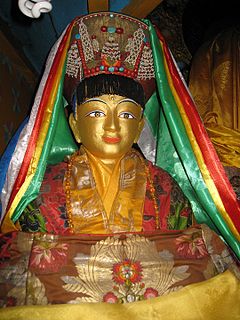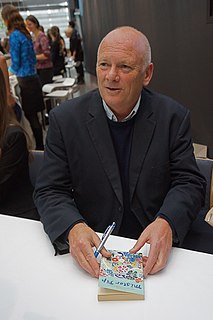A Quote by Charles Caldwell Ryrie
The use of our possessions shows us up for what we actually are.
Related Quotes
Demons frighten us because we set ourselves up to be frightened. We are overly attached to our reputations and possessions. When we love and desire what we should be rejecting, we are in conflict with our true selves. That's when the negative energies catch us and use our weapons against us. Instead of taking up what we have to defend ourselves, we put our swords in the hands of our enemies and make them attack us.
Some things are up to us [eph' hêmin] and some things are not up to us. Our opinions are up to us, and our impulses, desires, aversions–in short, whatever is our own doing. Our bodies are not up to us, nor are our possessions, our reputations, or our public offices, or, that is, whatever is not our own doing.
Material possessions, in themselves, are good. We would not survive for long without money, clothing and shelter. We must eat in order to stay alive. Yet if we are greedy, if we refuse to share what we have with the hungry and the poor, then we make our possessions into a false god. How many voices in our materialist society tell us that happiness is to be found by acquiring as many possessions and luxuries as we can! But this is to make possessions into a false god. Instead of bringing life, they bring death.
The paradox is that exactly the reverse is true. Everything that’s really worthwhile in life came to us free; our minds, our souls, our bodies, our hopes, our dreams, our ambitions, our intelligence, our love of family and children and friends and country. All these priceless possessions are free.
But the things that cost us money are actually very cheap and can be replaced at any time. A good man can be completely wiped out and make another fortune. He can do that several times. Even if our home burns down, we can rebuild it. But the things we got for nothing, we can never replace.
The real game of Bigger and Better that Jesus is playing with us usually isn't about money or possessions or even our hopes. It's about our pride. He asks if we'll give up that thing we're so proud of, that thing we believe causes us to matter in the eyes of the world, and give it up to follow Him. He's asking us, 'Will you take what you think defines you, leave it behind, and let Me define who you are instead?'
Our present culture, however, specializes in inflaming endless lust for possessions with advertisements that constantly convince us that we need more (particularly to create the ease we have never found). The marketers don't tell us much about their products, but they spend a great deal of energy (and enormous amounts of money) appealing to our fears and dreams. Thus, the idolatry of possessions plays to the deeper idolatry of our selves-and in an endlessly consuming society, persons are always remaking themselves with new belongings.
No matter how many possessions we acquire, they will not provide us with any lasting happiness and freedom. On the contrary, it is often our pursuit of material possessions that causes our problems. If we want ultimate happiness and freedom from suffering, we must engage in the supreme practices of training the mind. There is no other way.
We are told it will be of no use for us to ask this measure of justice--that the ballot be given to the women of our new possessions upon the same terms as to the men--because we shall not get it. It is not our business whether we are going to get it; our business is to make the demand.... Ask for the whole loaf and take what you can get.
In a very real way, the poor are our teachers. They show us that people’s value is not measured by their possessions or how much money they have in the bank. A poor person, a person lacking material possessions, always maintains his or her dignity. The poor can teach us much about humility and trust in God.
There are two gods. The god our teachers teach us about, and the God who teaches us. The god about whom people usually talk, and the God who talks to us. The god we learn to fear, and the God who speaks to us of mercy. The god who is somewhere up on high, and the God who is here in our daily lives. The god who demands punishment, and the God who forgives us our trespasses. The god who threatens us with the torments of Hell, and the God who shows us the true path.
There are two gods. A god who casts us off because of our sins, and a God who calls to us with His love.
Instead of working for white man and helping him hold up a government that continues to suppress us socially and, and exploit us economically and oppress us politically, let us go and enter our own territory and use our own talents to uplift ourselves by our own bootstraps. And then he will recognize us for what we are.





































